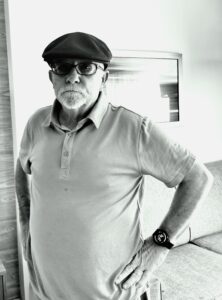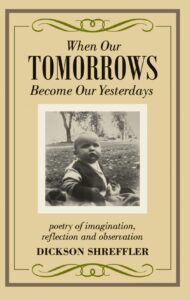Today, we are celebrating Dickson Shreffler. Since Deadlines for Writers started in 2017, many of our writers have gone on to publish and accomplish great things with their writing. The Prompt to Publication emails are all about celebrating these writers and their wonderful stories.
I hope these interviews will help and teach you how to use Deadlines for Writers to build your author platform.
Author feature: I’d like to introduce Dickson Shreffler
Have you completed any of the challenges on Deadlines for Writers?
Dickson Shreffler: I have contributed to every challenge since 2019
What have you published?
Dickson Shreffler: I have published a collection of my poetry covering my first poems from 1968 through 2024.
Has Deadlines for Writers helped you as a writer?
Dickson Shreffler: The feedback you receive is how you get better and learn to focus on the details that improve your writing. And you make great friends that, in my case, have given constructive criticism that I had to learn not to take personally.
What did you learn that you applied to your work?
Dickson Shreffler: Not to be afraid of trying. Writing is so personal that many writers don’t put themselves out there. You can’t improve if you don’t try.
What is your favourite poem you wrote for 12 Poems?
Dickson Shreffler: I don’t think I have a favourite. My poetry is very personal, and it is a reflection of my being, so it’s impossible to point to one poem.
Biography:

I was told I was bred in old Kentucky, but I was born in Glendale, California. I was child number four. Born to a woman I’m told was my mom. I remember I loved my sister most, the rest, I guess, a little. Pop worked in construction. He was strong and came home smelling of sweat and wood dust. Hazel was always unhappy. I remember Pop mostly because I miss him the most. If I had advice to kids, ask your parents questions, even if you don’t like them that much. You’ll want the answers someday. The only house I remember from that time is a mid-century modern three-bedroom, one-bath contemporary. I shared a bedroom with my sister, and the other two boys shared the other. I remember this period of my life because there are pictures, but no real explanations. We’d move back to Illinois for a year. It was 1961, that’s where the family lived, before Pop continued chasing the building trade to South Florida, where we would stay and where us siblings would eventually set out on our own path. I graduated high school in 1971; everything that happened in Florida, the highlights anyway, are written in this book. The mundane and normal were just days marked by each one becoming a yesterday with nothing of note to write about. I started at Publix Supermarkets in 1969. I have worked in retail successfully ever since. I started writing poetry a little before my work life started, but I haven’t any idea what the first poem was about, though it was probably about a girl I loved that week. So that’s my story so far. Thanks for taking the time — a commodity in short supply — to read and hopefully relate to these words and experiences. Peace.
Read Dickson‘s work
The Old Man
that was our life then.
The Incident 1978
Buy the book

“When Our Tomorrows” is a heartfelt collection of poetry and prose by Dickson that captures the essence of truth and sincerity. His imaginative and nostalgic verses are accessible and relatable, inviting readers to engage with his reflections on life and relationships. Through his questioning style, Dickson evokes a sense of shared emotions, creating a warm connection with his audience
Well done, Dickson!
Want to be featured on Prompt to Publication?
Are you an active, participating member of Deadlines for Writers? Do you have publishing news to share? Please mail mia@12shortstories.com and tell her all about it.
